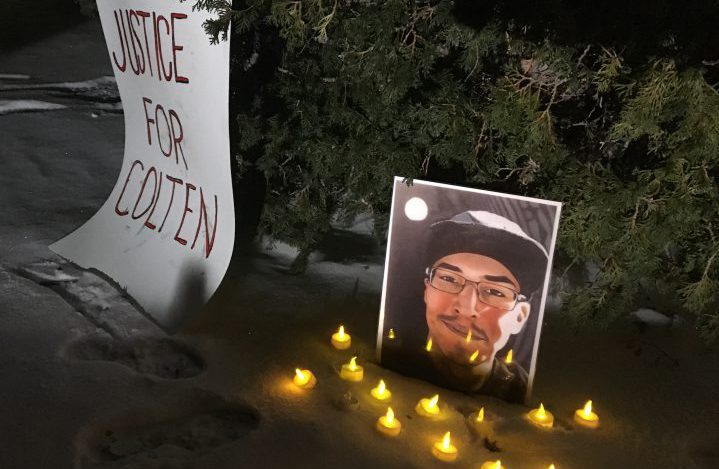A newly released document shows prosecutors in Saskatchewan weighed backlash and remorse felt by people accused of posting hateful online messages after the high-profile shooting death of a young Cree man.

Tuesday marks the three-year anniversary of the acquittal of Gerald Stanley in the death of 22-year-old Colten Boushie of Red Pheasant First Nation, after he and his friends drove onto Stanley’s farm near Biggar, Sask., in 2016.
Stanley’s trial heard from Boushie’s friends, who testified they had been looking for help with a flat tire. Stanley told court he thought they were trying to steal an all-terrain vehicle and his gun accidentally went off, firing a bullet into the back of Boushie’s head.
A jury found Stanley not guilty of second-degree murder.
Boushie’s death caused racial tensions in the province to flare and sparked debate on systemic racism toward Indigenous people and rural crime.
A deluge of online comments made after the shooting was the subject of a recently revised briefing note prepared for incoming Saskatchewan Justice Minister Gord Wyant by the public prosecutions branch. The partially-redacted document, dated last November, was released to The Canadian Press under Freedom of Information legislation.
“Some people made comments online approving of the violence done to Mr. Boushie, and lamenting that more of his group had not been killed that day,” it reads.
“A number of people who made comments like this were themselves subjected to an online shaming campaign, which included potentially threatening messages.”

The prosecutions office says it reviewed RCMP investigations into the comments and didn’t recommend charges because there was no reasonable likelihood of conviction.
“Public Prosecutions also considered the remorse of the suspects and the social media consequences they had already received in determining whether there was a public interest in pursuing charges,” the document says.

Get daily National news
Chris Murphy, a lawyer for Boushie’s family, says he believes the comments fit the Criminal Code’s definition of hate speech towards an identifiable group.
He says he finds the rationale by the prosecutions office troubling because of the message it sends.
“(It) suggests that you can say hateful things about Indigenous people in Saskatchewan and you don’t have to fear reprisals from the police for those statements if you’ve been shamed online for saying them, which to me is frankly unbelievable.”
Murphy says remorse is a principle when it comes sentencing, but in this case it appears to have been applied with “a significant amount of leniency.”
“I don’t ask this lightly, but I ask whether or not the public would believe that Indigenous people who are the subjects of criminal investigations in Saskatchewan are granted the same sort of leniency.”
He also questions why neither Boushie’s family nor legal counsel were informed that some people accused of making the posts had expressed remorse.
RCMP spokesman Cpl. Rob King says about 85 online accounts were investigated for comments made about Boushie’s death and the Stanley trial. Different police forces were involved, depending on where the accounts were located.
Officers informed those who made complaints about the outcomes of the investigations, King says, and Boushie’s family didn’t file complaints.
He adds that details of investigations are usually made public once charges are laid, but are otherwise subject to privacy laws.
“Prosecutions recommends charges where there is a reasonable likelihood of conviction and it is in the public interest to prosecute. In these instances, neither of these two thresholds were met,” says Ministry of Justice spokesman Noel Busse.
“Depending on the situation, prosecutors may also take publicly observable information into account.”
Eleanore Sunchild, a lawyer based in North Battleford, Sask., who also represents Boushie’s family, says the briefing document fails to mention the problem of racism.

“It’s like they feel if they don’t acknowledge the racism that exists here _ it’s not an issue.
“The issue is far from over. We still see continued injustice occur every day in Canada against Indigenous people.”
She says marking the anniversary of the verdict will be more difficult for Boushie’s family this year because COVID-19 restrictions mean they cannot gather in person.
“If everyone could just remember them and say a prayer for Colten.”







Comments
Want to discuss? Please read our Commenting Policy first.